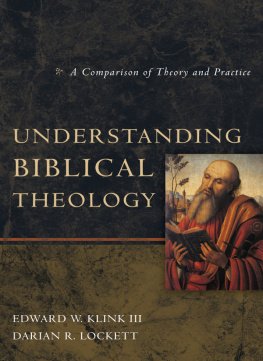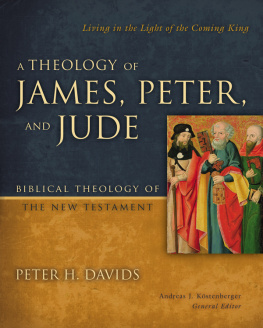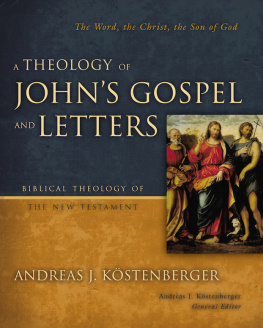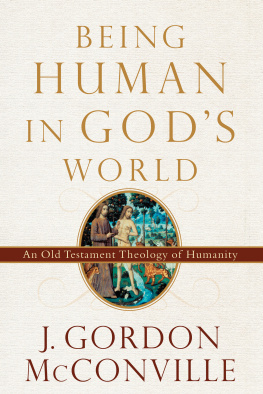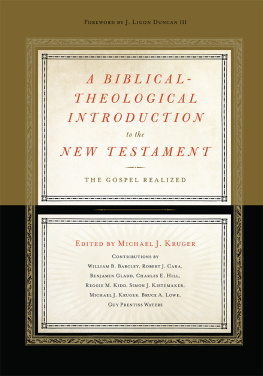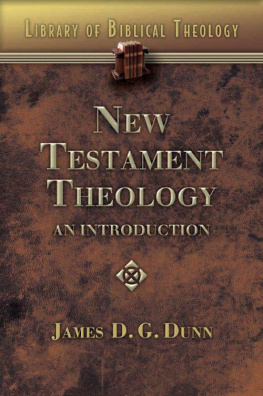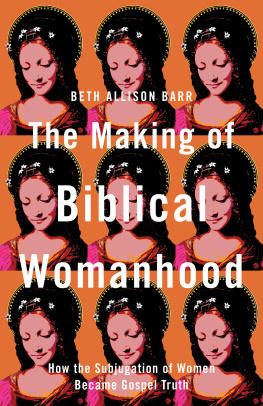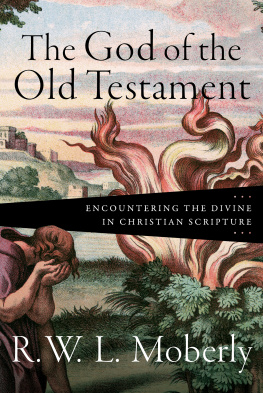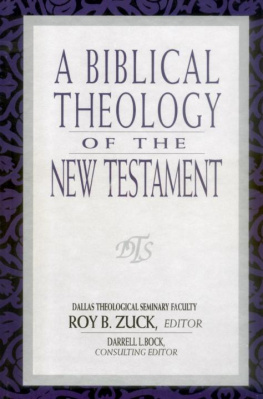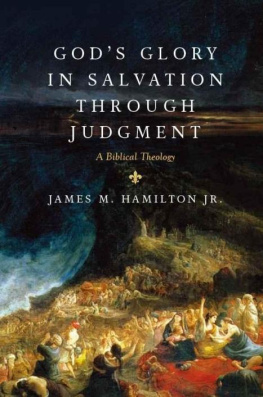James Barr - The Concept of Biblical Theology: An Old Testament Perspective
Here you can read online James Barr - The Concept of Biblical Theology: An Old Testament Perspective full text of the book (entire story) in english for free. Download pdf and epub, get meaning, cover and reviews about this ebook. year: 2008, genre: Religion. Description of the work, (preface) as well as reviews are available. Best literature library LitArk.com created for fans of good reading and offers a wide selection of genres:
Romance novel
Science fiction
Adventure
Detective
Science
History
Home and family
Prose
Art
Politics
Computer
Non-fiction
Religion
Business
Children
Humor
Choose a favorite category and find really read worthwhile books. Enjoy immersion in the world of imagination, feel the emotions of the characters or learn something new for yourself, make an fascinating discovery.
- Book:The Concept of Biblical Theology: An Old Testament Perspective
- Author:
- Genre:
- Year:2008
- Rating:5 / 5
- Favourites:Add to favourites
- Your mark:
- 100
- 1
- 2
- 3
- 4
- 5
The Concept of Biblical Theology: An Old Testament Perspective: summary, description and annotation
We offer to read an annotation, description, summary or preface (depends on what the author of the book "The Concept of Biblical Theology: An Old Testament Perspective" wrote himself). If you haven't found the necessary information about the book — write in the comments, we will try to find it.
James Barr: author's other books
Who wrote The Concept of Biblical Theology: An Old Testament Perspective? Find out the surname, the name of the author of the book and a list of all author's works by series.
The Concept of Biblical Theology: An Old Testament Perspective — read online for free the complete book (whole text) full work
Below is the text of the book, divided by pages. System saving the place of the last page read, allows you to conveniently read the book "The Concept of Biblical Theology: An Old Testament Perspective" online for free, without having to search again every time where you left off. Put a bookmark, and you can go to the page where you finished reading at any time.
Font size:
Interval:
Bookmark:

Biblical Theology
James Barr
This book is dedicated to the universities of Oslo and Helsinki in gratitude for the award of honorary doctorates in theology from each of them
This book is descended from the Cadbury Lectures, delivered in the University of Birmingham as long ago as 1968. Perhaps they should have been published at that time, but I felt the need, before publication, to read all through the classic works of Old Testament theology once again and verify my assessment of them, as it then was. This took time, and meanwhile important new studies were published; also my own ideas changed. And yet I still feel that my early volume Old and New in Interpretation (1966) remains the basis of the vision now presented. The delivery of the Firth Lectures at the University of Nottingham in 1978 provided a further stage in my thinking that is incorporated here. Basic earlier expressions of my thinking were those in the articles `Biblical Theology' in the Supplementary Volume to The Interpreter's Dictionary of the Bible, 10411, and later, in more developed form, in the article `Biblische Theologie' in the Evangelisches Kirchenlexikon, I, cols. 488-94.
But the work in its present form is written as a sort of textbook: when I have given courses on Old Testament theology, especially in my periods of teaching in Edinburgh, in Princeton, in Oxford and at Vanderbilt, this is the sort of approach that I have adopted, though the book has been expanded to contain much more material than one could cover in a single course of the normal kind.
The work is not intended to be a biblical theology, still less to be `my' biblical theology (an expression which I would find improper); rather, it is a discussion of the whole idea of biblical theology, its possibilities and its prospects. It is neither a survey nor a history, though it includes some elements of both of these. I have selected persons and themes which have seemed fruitful or significant for my own thinking but have made no attempt to survey all the Theologies that have been written or all the material that has been brought forward in the discussion. If there is any one theme that runs through this work, it is the contested character of biblical theology, as it has been in this century. Biblical theology has had its enthusiasts, who cannot understand why anyone would question its validity as a subject; it has also had its opponents, some of whom consider it to be impracticable as an area of research, or unacceptable as an academic subject, or useless to the religious community, or all three of these. It is my belief that these elements of opposition have to be faced and understood, and that the understanding of them may paradoxically assist in the continuance and future prosperity of biblical theology, or of something like it. Though I have been at times a severe critic of some tendencies within biblical theology, I have continued to be deeply involved in the subject throughout my academic life, and it has remained one of the two major elements in my professional interests, the other being language and text. I believe that at the end of the day something of the nature of biblical theology will remain necessary, and that not only biblical scholarship, but also theology as a whole, would be much the poorer without it.
As the title of the book indicates, I approach the subject from the Old Testament side and do not attempt to give an even representation of New Testament theology, although I do bring in some treatment of it in particular areas. Though very much interested in discussions in the New Testament field, I did not feel that I should venture into a more profound consideration of its currents and tendencies.
The book begins with the question why it has been so difficult to define biblical theology, and suggests that this is because `biblical theology' is an essentially contested notion, which changes its character according to that with which it is contrasted. Six different contrasts are discussed, each of which causes `biblical theology' to appear in a different light. We return to these contrasts later, in Chapters 5, 6, 8, 9, to and 12. But before doing this Chapter 2 gives a short historical survey of the origins of modern Old Testament theology, and Chapter 3 presents a typology of what seem to me to be the five main types, four of them emerging in the `classic' period (about 1930 to 1965) plus one, the `canonical' approach, more recently. The chapter gives a characterization of each of the types and then returns over each to describe some of the problems that have been seen in each. Chapter 4 is entitled `A Wider Spectrum' and suggests that biblical theology takes many other forms than the writing of comprehensive `Theologies' of Old or New Testament, or indeed of the entire Bible.
Chapter 5 discusses the contrast between biblical and doctrinal theology, Chapter 6 the difference seen between biblical theology and non-theological study of the Bible. Chapter 7 is a sort of interlude, and treats of the idea of evolution and the anti-evolutionism that has animated much biblical theology. It arose originally as an element in the next chapter but grew so much that it had to be separated off. Chapter 8 introduces the contrast with the approach through the history of religion and Chapter 9 considers the question of the size of the complexes taken as basic for theological study. Chapter io is concerned with the relations of biblical theology to biblical (and other) ways of thinking, and introduces relations with philosophy and, further, the question of natural theology. Chapter i i asks about the degree to which Old Testament Theologies have established connections with the New. Chapter 12 tries to assess the opposition commonly seen between `committed' and `objective' approaches. Chapter 13 puts forward the suggestion that `historical theology' offers a good analogy to biblical theology and helps to explain how it can be understood as having the character of `theology' at all.
Chapter 14 tries to review the various ways in which scholars have stood in opposition to biblical theology. Chapter 15 introduces a difficulty that has often been neglected, namely the fact that doctrinal theologians are commonly sceptical of biblical theology and do not support the endeavours that lead into it. It includes also the associated question how far the contents of the Bible should count as `theology' at all. Following this, Chapter 16 considers the effort to avoid `Christianizing' of the Old Testament, Chapter 17 looks at the evaluation of post-biblical Judaism, and Chapter 18 at the possible prospects for Jewish biblical theology.
With Chapter ig we look at some of the `newer-style' Theologies that appeared in the 197os, and Chapter 20 returns to attempt a general evaluation of the Theologies thus far discussed. Chapter 21 seeks to formulate some suggestions in the area of story and history in relation to theology. In Chapter 22 we consider the proposals of Professor Hartmut Gese, and Chapters 23, 24 and 25 are devoted to the `canonical' methods as applied by Professor Childs and others, which are here examined in more breadth and detail. With Chapter 26 we come to some of the most recent Theologies, published in the 1990s. Chapter 27 considers the impact which the revival of natural theology is likely to have on any sort of biblical theology.
Font size:
Interval:
Bookmark:
Similar books «The Concept of Biblical Theology: An Old Testament Perspective»
Look at similar books to The Concept of Biblical Theology: An Old Testament Perspective. We have selected literature similar in name and meaning in the hope of providing readers with more options to find new, interesting, not yet read works.
Discussion, reviews of the book The Concept of Biblical Theology: An Old Testament Perspective and just readers' own opinions. Leave your comments, write what you think about the work, its meaning or the main characters. Specify what exactly you liked and what you didn't like, and why you think so.



